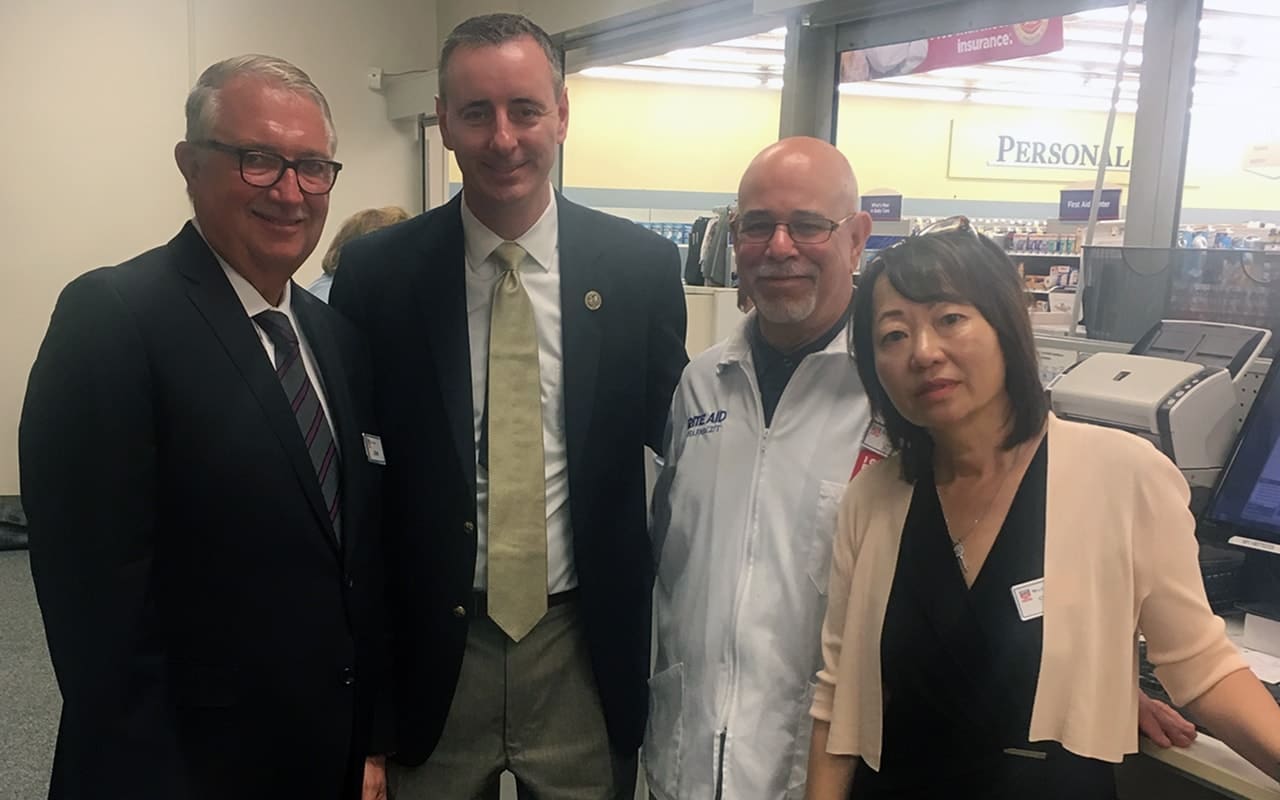
U.S. Rep. Brian Fitzpatrick, second from left, touring a Rite Aid Pharmacy
Arlington, Va. – The National Association of Chain Drug Stores (NACDS) has endorsed new bipartisan legislation introduced by Rep. Brian Fitzpatrick (R-PA) that would improve the interoperability of state prescription drug monitoring programs (PDMPs): the Monitoring and Obtaining Needed Information to Track Opioids Responsibly (MONITOR) Act (H.R. 4236).
A PDMP is a technological approach to tracking controlled-substance prescriptions, which is a critical tool to help identify individuals that may be “doctor shopping,” or seeking to gain access to more opioids by visiting multiple prescribers who could be unaware of other prescriptions that have been obtained and filled.
Rep. Fitzpatrick said, “This bipartisan legislation provides the pathway to efficiency and effectiveness in the use of grant funds tied to prescription drug monitoring programs. Our nation’s drug epidemic is a complicated issue, and our response must be multi-faceted; that means reducing unnecessary dispensing of prescriptions by tracking and reporting information that allows physicians, pharmacists, and other health professionals to make informed clinical decisions and identify unseemly prescribing trends.”
NACDS’ reaction to the bill was included in a press release issued by Rep. Fitzpatrick, along with comments from members of the enforcement, prescriber and rehabilitation communities, and others personally affected by the epidemic. The press release quoted NACDS President and CEO Steven C. Anderson, IOM, CAE: “NACDS appreciates Congressman Fitzpatrick’s leadership in advancing legislation to create a truly interoperable [PDMP] solution. Pharmacists serve patients and their communities on the front lines of healthcare delivery, and based on their experiences it is more and more clear that a more unified approach to a PDMP will provide more complete and useful information to prescribers and dispensers alike. That will increase the potential for a PDMP to be helpful in assuring that controlled substances make their way into the right hands only. The concept behind Congressman Fitzpatrick’s legislation is consistent with comprehensive new public policy recommendations that NACDS has announced, and we thank him for his proactive engagement on this crucial issue.”
Specifically, the legislation incentivizes states to have a PDMP that meets minimum requirements and directs each state to use a portion of federal HHS grants to meet the requirements. The measure requires dispensers to report each dispensing of a controlled substance prescription within one business day and meet baseline standards of interoperability for state systems to share information. Additionally, the legislation authorizes an advisory group composed of community pharmacists and other critical health practitioners who prescribe and dispense medication to make future recommendations.
In anticipation of President Trump’s October 26 declaration of the opioid abuse epidemic as a public health emergency, NACDS wrote a letter to the president and outlined four public policy proposals intended to build on existing collaborative efforts to address the opioid abuse epidemic and pharmacy’s ongoing engagement on the issue.
NACDS’ new policy recommendations are:
• Legislate a 7-day supply limit for initial opioid prescriptions issued for acute pain
• Legislate a requirement that all prescriptions be issued electronically, with limited exceptions
• Create a national prescription drug monitoring program (PDMP) through collaboration
• Provide manufacturer-funded mail-back envelopes for unused opioid drugs, available to patients at pharmacies upon request.
NACDS also issued a statement last week in response to a report from the President’s Commission on Combating Drug Addiction and the Opioid Crisis noting that many of the Commission’s concepts were consistent with NACDS’ new proposals, including a recommendation to support the Prescription Drug Monitoring (PDMP) Act to mandate that states receiving grant funds must comply with PDMP requirements, including data sharing.
NACDS remains committed to partnering with federal and state agencies, policymakers and others to collaborate on practical, sustainable strategies to prevent prescription drug diversion and abuse, including prescription opioids.